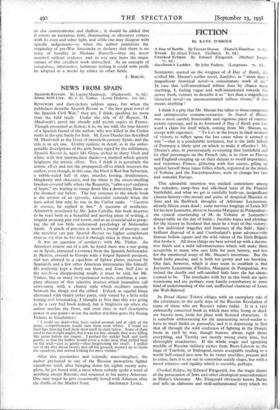NEWS FROM SPAIN
REVIEWERS and dust-jackets seldom agree, but when the publishers describe Spanish Recruit as " the first great novel of the Spanish Civil War," they are, I think, speaking no more than the bald truth. Under the title of El Requeti, M. Maulvault's novel has already sold 30,000 copies in France.
Though presented as fiction, it is, we are told, the true history of a Spanish friend of the author, who was killed in the Carlist ranks in the epic battle for Irun. M. Leon Daudet has described M. Maulvault as the Goya of twentieth-century Spain, and the title is an apt one. Grimly realistic in detail, as in the unfor- gettable descriptions of the girls being raped by the militiamen, Spanish Recruit is, again like Goya, etched in sharp black and
white, with few intermediate shades—a method which greatly heightens the artistic effect. Yes, I think it is genuinely the artistic effect and not the propaganda effect which interests the author, even though, in this case, the black is Red San Sebastian, a rabble-ruled hell of rape, murder, looting, drunkenness, blasphemy and obscenity, and the white is the sweet-smelling
bracken-covered hills where the Requetes, "calm-eyed and pure of heart," are waiting to sweep down like a destroying flame on the doomed city below. The key sentence to the whole book is the answer of an agnostic, rationalist comrade when the hero asked him why he was in the Carlist ranks. " Cuestion de estetica, he replied at last." A question of aesthetics. Admirably translated by Mr. John Colville, this book deserves to be read both as a beautiful and moving piece of writing, a tragedy arousing pity and terror, and as an essential aid to grasp- ing the all too little understood psychology of Nationalist Spain. A pinch of practice is worth a pound of precept, and the reviewer can pay Spanish Recruit no higher compliment
than to s2y that he has read it through twice in three weeks.
It was no question of aesthetics with Mr. Tinker. An American aviator out of a job, he heard there was a war going on in Spain, extracted a contract from the Spanish Ambassador in Mexico, crossed to Europe with a forged Spanish passport, and was allotted to a squadron of fighter planes manned by
Spaniards and a few other American mercenaries like himself He evidently kept a diary out there, and Some Still Live is
the result—a disappointing result, it must be said, for Mr. Tinker, like so many inexperienced writers, combines a com- plete absence of that selective instinct which journalists call news-sense with a clumsy style which oscillates uneasily between the slangy and the stilted. Indeed, as squalid binge alternated with dreary poker party, only varied by a little mild
looting and lovemaking, I thought at first that this was going to be a very bad book indeed, but it brightens up when the
author reaches the front, and even rises to real descriptive power at one point—v2en the author machine-guns the fleeing Italians at Guadalajara.
" I could see dead-white faces swivel around, and at sight of the plane, comprehension would turn them even whiter. I could see their lips drawing back from their teeth in stark terror. Some of them tried to run at right angles, but it was too late; already they were falling like grain before the reaper. I pushed the rudder back and forth gently, so that the bullets would cover a wider area, then pulled back on the stick—just as gently—thus lengthening the swath. I pulled out of the dive about twenty feet off thezround, zoomed up to rejoin the squadron, and started looking for more victims."
•
After this passionless and scientific mass-slaughter, the
author graduated to one of the Russian monoplane fighter squadrons until, after bringing down his eighth enemy aero- plane, he got bored with a mess where nobody spoke a word of anything except Russian, and returned to his native Arkansas. One may wager he gets occasionally bored with Arkansas after
the thrills of the Madrid front. ARCHIBALD LYALL.






































 Previous page
Previous page